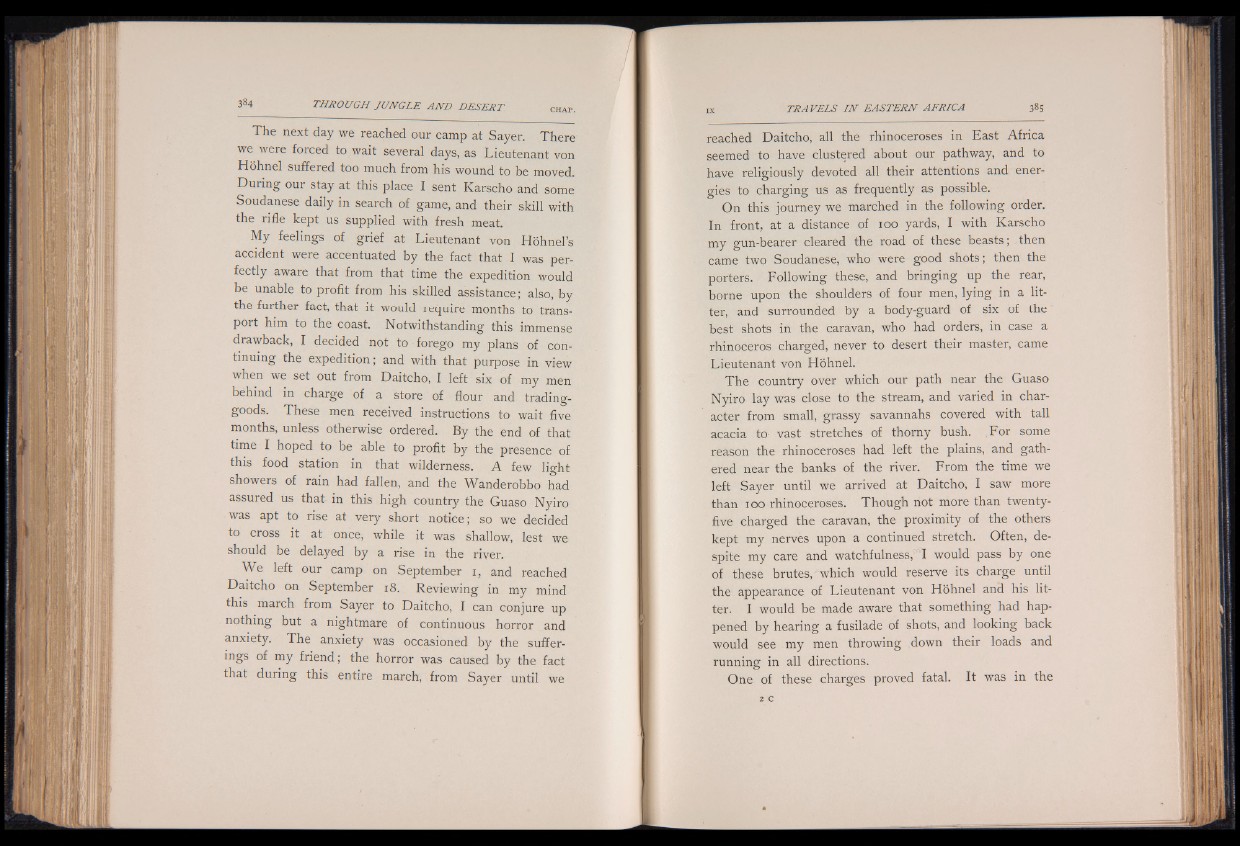
The next day we reached our camp at Sayer. There
we were forced to wait several days, as Lieutenant von
Hohnel suffered too much from his wound to be moved.
During our stay at this place I sent Karscho and some
Soudanese daily in search of game, and their skill with
the rifle kept us supplied with fresh meat.
My feelings of grief at Lieutenant von Hohnel’s
accident were accentuated by the fact that I was perfectly
aware that from that time the expedition would
be unable to profit from his skilled assistance; also, by
the further fact, that it would require months to transport
him to the coast. Notwithstanding this immense
drawback, I decided not to forego my plans of continuing
the expedition; and with that purpose in view
when we set out from Daitcho, I left six of my men
behind in charge of a store of flour and trading-
goods. These men received instructions to wait five
months, unless otherwise ordered. By the end of that
time I hoped to be able to profit by the presence of
this food station in that wilderness. A few light
showers of rain had fallen, and the Wanderobbo had
assured us that in this high country the Guaso Nyiro
was apt to rise at very short notice; so we decided
to cross it at once, while it was shallow, lest we
should be delayed by a rise in the river.
We left our camp on September 1, and reached
Daitcho on September 18. Reviewing in my mind
this march from Sayer to Daitcho, I can conjure up
nothing but a nightmare of continuous horror and
anxiety. The anxiety was occasioned by the sufferings
of my friend; the horror was caused by the fact
that during this entire march, from Sayer until we
reached Daitcho, all the rhinoceroses in East Africa
seemed to have clustered about our pathway, and to
have religiously devoted all their attentions and energies
to charging us as frequently as possible.
On this journey we marched in the following order.
In front, at a distance of 100 yards, I with Karscho
my gun-bearer cleared the road of these beasts; then
came two Soudanese, who were good shots; then the
porters. Following these, and bringing up the rear,
borne upon the shoulders of four men, lying in a litter,
and surrounded by a body-guard of six of the
best shots in the caravan, who had orders, in case a
rhinoceros charged, never to desert their master, came
Lieutenant von Hohnel.
The country over which our path near the Guaso
Nyiro lay was close to the stream, and varied in character
from small, grassy savannahs covered with tall
acacia to vast stretches of thorny bush. For some
reason the rhinoceroses had left the plains, and gathered
near the banks of the river. From the time we
left Sayer until we arrived at Daitcho, I saw more
than 100 rhinoceroses. Though not more than twenty-
five charged the caravan, the proximity of the others
kept my nerves upon a continued stretch. Often, despite
my care and watchfulness, I would pass by one
of these brutes, which would reserve its charge until
the appearance of Lieutenant von Hohnel and his litter.
I would be made aware that something had happened
by hearing a fusilade of shots, and looking back
would see my men throwing down their loads and
running in all directions.
One of these charges proved fatal. It was in the
2 c